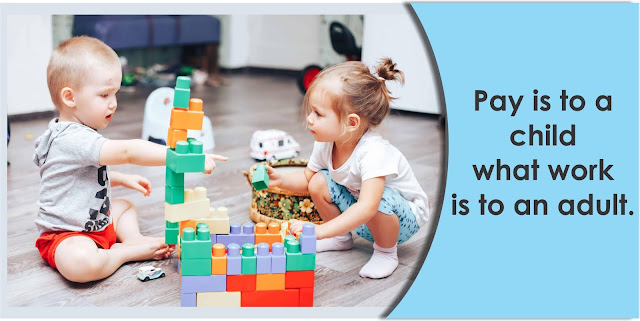“The children do not want to be naughty. It tires and bores them to be idle. Of their own accord they work hard, seek after knowledge, co-operate with their elders, and dwell in helpful harmony with one another.”- Anonymous
The online Wikipedia defines “Play as a range of intrinsically motivated activities done for recreational pleasure and enjoyment.”
Play as define by PlayEd is a “behavior that
is freely chosen, personally directed and intrinsically motivated”
Play is the work of the child. It is the
spice of life. It consists of those activities that have behavioral, social,
psychomotor, affective and cognitive rewards. Play is child directed and it is
spontaneous and enjoyable.
In the first year of a child’s life (0-6
years, more importantly 0-3) the child takes in the whole of his environment
unconsciously this is because nature has given the child a kind of mind that
absorbs information from the environment. The child absorbs these impressions
from the environment without knowing it and willing it. In this way he
accumulates the materials from which he will later build up his conscious life.
This complex process via which the unconscious mind absorb information can be likened to how a photograph is taken. When a picture is taken, it undergoes a process of development. In the darkness, it is fix then brought up to light, where you can see it on paper, where it remains fix and unalterable. So is it with the mind of a child. Impressions begins deep down in the darkness of the subconscious mind; it is developed and fixed there; and finally emerges into consciousness, where it remains fixed for a long time.
Man has, until recently, grapple to
understand this. Till date, people still see the first 6 months of a child life
as only concerned with eating, drinking, sleeping, and crying. Science has
proven that within these period a child absorbs, if not, all the information he
needs unconsciously and gradually passes it consciously.
A big question to ask is: How does a child passes this information from the unconscious
to the conscious? It is through play; which follows the path of pleasure
and love. Remember our definition of play. When the child begins to move, his
absorbent mind has already taken in the world unconsciously. Now, as he starts
to play, he becomes conscious. If you watch a small child of two, or even one,
he is always manipulating something. Children model adults. You see a child,
sits quietly, observing and absorbing information – what an adult is doing,
let’s say cooking, few hours or days later, you see the child doing same thing
- from assembling cooking utensils, to deciding what to cook, gathering the
ingredients, and so on. This means that while he is manipulating with his
hands-he is bringing into consciousness what his subconscious mind had already
taken in before. It is through this experience of objects in his environment,
in the guise of playing, that he goes over again the impressions that he has
already taken in with his unconscious mind. It is by means of this work -for it
is as much work as play- that he becomes conscious, and constructs
himself.
Basically, when children want to play they
want to download the information they have absorbed unconsciously and make it
conscious. The danger here is, when an adult interrupts a child that is
playing, he interrupts the development of the child. You see children crying,
throwing tantrums, when you tamper with their play toys or area, it is not
because you disrupt their play, you have interrupted their development.
Next article I will outline the different
types of play and importance of play.


Comments
Post a Comment